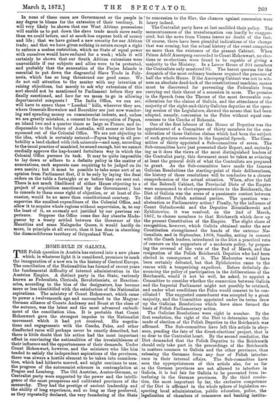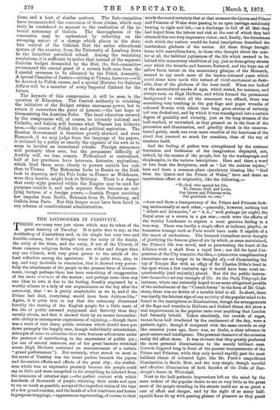HOME-R1TLE IN GALICIA.
MHE Polish question in Austria has entered into a new phase which, in whatever light it is considered, promises to mark the inauguration of a new era in the history of Central Europe. The conciliation of the Nationalities has formed of recent years the fundamental difficulty of internal administration in the Austrian Empire. A distinct party in the State, variously known as Federalists, Clericals, Revolutionists, or Reaction- aries, according to the bias of the designators, has become more or less identitified with the satisfaction of the Nationalist aspirations. The ministry of Count Hohenwart, which came to power a twelvemonth ago and succumbed to the Magyar- German alliance of Counts Andrassy and Benet at the close of the autumn was the latest and the most advanced embodi- ment of the conciliation idea. It is probable that Count Hohenwart gave the strongest impulse to the Nationalist movement which it had yet received. His negotia- tions and engagements with the Czechs, Poles, and other disaffected rues will perhaps never be exactly described, but there is little doubt that his action had the most important effect in convincing the nationalities of the irresistibleness of their influence and the opportuneness of their demands. Under Count Hohenwart, however, and the ministers who like him tended to satisfy the independent aspirations of the provinces, there was always a hostile element to be taken into considera- tion, which had hitherto marred, and might continue to mar, the progress of the autonomist schemes in contemplation at Prague and Lemberg. The Old Austrian, Austro-German, or Centralist party were supported by the power and the intelli- gence of the most prosperous and cultivated provinces of the monarchy. They had the prestige of ancient leadership and the ability of long experience, and so long as they preferred, as they repeatedly declared, the very foundering of the State to concession to the Slav, the chances against concession were heavy indeed.
The Centralist party have at last modified their policy. The momentousness of the transformation can hardly be exagger- ated, but the news from Vienna leaves no doubt of the fact. Of course, there have been plentiful indications of the change that was coming, but the actual history of the event comprises no more than the existence of the present Cabinet. When Prince Adolf Auersperg succeeded to Count Hohenwart, no elec- tions or re-elections were found to be capable of giving a majority to the Ministry. In a Lower House of 204 members the Centralists only mustered 95. The barest quorum for the despatch of the most ordinary business required the presence of half the whole House. If the Auersperg Cabinet was not to wit- ness an absolute dead-lock of the constitutional machine, means must be discovered for preventing the Federalists from carrying out their threat of a secession in mass. The promise in the Speech from the Throne of the most favourable con- sideration for the claims of Galicia, and the attendance of the majority of the eight-and-thirty Galician deputies at the open- ing session of the Legislature, showed the means that had been adopted, namely, concession to the Poles without equal con- cessions to the Czechs of Bohemia.
One of the first labours of the House of Deputies was the appointment of a Committee of thirty members for the con- sideration of those Galician claims which had been the subject of such gracious reference in the Imperial Speech. The Com- mittee of thirty appointed a Sub-committee of seven. The Sub-committee have just presented their Report, and, embody- ing as it does the views of the most distinguished leaders of the Centralist party, this document must be taken as evincing at least the general drift of what the Centralists are prepared to grant. As the Sub-committee have made the famous Galician Resolutions the starting-point of their deliberations, the history of these resolutions will be conducive to a clearer comprehension of the actual situation. When, after the fall of the Belcredi Cabinet, the Provincial Diets of the Empire were summoned to elect representatives to the Reichsrath, the Diet of Galicia was the scene of a passionate contest between the different Polish national parties. The question was : abstention or Parliamentry action? Finally, by the influence of Count Goluchowski and the Deputies Ziemialkowski and Zybliciewicz, it was resolved, on the 2nd of March, 1867, to choose members to that Reichsrath which drew up the present Constitution of the Empire. The slight share of recognition, however, which Galicia obtained under the new Constitution strengthened the hands of the extreme Na- tionalists, and in September, 1868, Smelka, acting in concert with the Czech leaders, introduced in the Diet a practical vote of censure on the supporters of a moderate policy, by propos- ing the reversal of the vote of the End of March, and the resignation of the Polish Reichsrath Deputies who had been elected in consequence of it. The Moderates would have been certainly defeated, but that Zybliciewicz came to the rescue with a temporizing expedient. Before definitely de- . nouncing the policy of participation in the deliberations of the Reichsrath, would it not be well, he asked, to appoint a Committee to consider whether the connection between Galicia and the Imperial Parliament might not possibly be retained, and under what conditions the Poles would consent to be con- ciliated? The suggested amendment was accepted by a great majority, and the Committee appointed under its terms drew up the Galician Resolutions which have since formed the basis of Polish Parliamentary action.
The Galician Resolutions were eight in number. By the first resolution, the right of the Diet to determine upon the mode of election of the Polish Deputies to the Reichsrath was affirmed. The Sub-committee have left this article in abey- ance, pending the fate of the direct-elections' project, that is so dear to the Centralist heart. By the second resolution, the Diet demanded that the Polish Deputies to the Reichsrath should only take part in the proceedings of the Reichsrath in matters common to Galicia and the other provinces, thus releasing the Germans from any fear of Polish interfer- ence in their internal affairs. The Sub-committee have seen the appropriateness of this article also, for so far as the German provinces are not allowed to interfere in Galicia, it is but fair for Galicia to be prevented from in- terfering in the German provinces. By the third resolu- tion, the most important by far, the exclusive competence of the Diet is affirmed in the whole sphere of legislation re- specting local administration, public education, police, the legalization of chambers of commerce and banking =tan- tions, and a host of similar matters. The Sub-committee have recommended the concession of these claims, which may truly be considered to amount to the realization of the in- ternal autonomy of Galicia. The thoroughness of the concession may be understood by reflecting on the sweeping nature of a change which places in the abso- lute control of the Galician Diet the entire educational system of the country, from the University of Lemberg down to the humblest parochial school. Among the remaining resolutions, it is sufficient to notice that instead of the separate Galician budget demanded by the Diet, the Sub-committee recommend the annual grant of a certain bulk sum from the Imperial revenues to be allocated by the Polish Assembly. A special Chamber of Justice—sitting at Vienna, however—will be devoted to Polish causes, and a special Minister for Galician Affairs will be a member of every Imperial Cabinet for the future.
The keynote of this compromise, it will be seen, is the question of Education. The Central authority in retaining the initiative of the Budget retains enormous power, but in return it surrenders the point of honour,—the last hope of Germanizing the Austrian Poles. The local education secured by the compromise will, of course, be intensely national and Catholic, and Galicia will become what Warsaw has hitherto been,—the centre of Polish life and political aspiration. The Russian Government is therefore greatly alarmed, and even Bismarck, if we may judge from the language of his papers, is irritated by a policy so exactly the opposite of his own as to seem to involve an intentional rebuke. Foreign annoyance will probably blow over, but the permanent difficulty of Austria will, we fear, remain. Federalized or centralized, half of her provinces have interests, histories, aspirations, which bind them more closely to powers outside her rule than to Vienna. The Bohemian looks to Russia as the Irish look to America, and the Pole looks to France as Welshmen, were they hostile, might look to Brittany. There is a danger that every right granted within the Empire may be used for purposes outside it, and each separate State become an out- lying fortress of a foreign power,—Austria Proper receiving her impulse from Berlin, Bohemia from St. Petersburg, and Galicia from Paris. But this danger must have been faced in any scheme of constitutional administration.



































 Previous page
Previous page